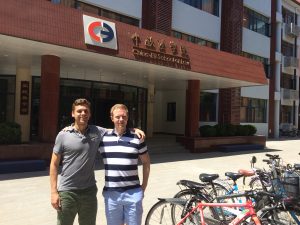
This is Part II of the interview with Michael Ristaniemi. In Part I we discussed his background and motivation for the dissertation. In this part we will dive deeper into the actual contents of the dissertation and Michael’s reflection on recent developments in antitrust globally with some comparative thoughts.
Did anything surprise you as you worked on the thesis?
To be frank a lot of stuff surprised me and its more of a question what to emphasize. The first clear thing that was interesting to realize is that many things are so interrelated. When you are doing research as a student for your Master’s thesis and then for your PhD you are focusing on a very narrow niche. One major aha-moment for myself was realizing how this niche is really linked to many other areas and how they inter-develop. For instance, one article in my dissertation covered the fact that whatever the major economic powers of the globe think about cooperating really shapes how international competition can develop in practice. For example, the preference of how the US to cooperate bilaterally or multilaterally affects many things globally, including what I covered in my dissertation.
Currently there is a lack of a strong political will to cooperate multilaterally. In some extent China isn’t representative of that. They have their own multilateral agreements that are outside the ones that we are used to seeing in Western countries. But the trend that is seen generally across international law to patch the lack of political cooperation is the rise of so-called trans-governmental networks. They are not on the political level but rather authorities of different countries cooperating very closely. It has led to technocratic international governance as opposed to political level international law in a way. This in fact has a really strong impact, both positive and negative.
A second memorable point I want to mention is the ignorance of history in competition law. I think most people aren’t aware of the origin of competition law in the EU or the US. Nowadays it has been more about using modern-day economic theory to improve consistency of competition law application. This is important, but there is perhaps something to learn in how competition law started independently in both places (EU and US). Competition law is a response to the allergy towards too much economic and political dominance by companies and was a way to manage that dominance. It is something we are seeing a need for with the digital economy. A lot of the discussions that are being had today in competition law circles wouldn’t be all that different if we go back to the 1950s or even 30s.
We found the point you made in your thesis:” The EU has taken a much more interventionist approach than the American, or Chinese agencies have towards unilateral conduct of key digital platform firms, such as Amazon, Google, and WeChat” extremely interesting. Could you talk a bit more about China’s position?
The general trend when I was writing my dissertation was that the EU was sort of the outlier by being interventionist to the extent it has been. Since I have finished my dissertation the US has brought two big lawsuits against both FB and Google, and China has published a draft revision to its anti-monopoly law (the Chinese competition law) and also drafted guidelines concerning the platform economy. Therefore, the tide is changing. I have to say I am not a huge expert on the application of Chinese competition law, but what I can say is that competition law is very new in China. The first competition law was enacted in only 2008. What they have been doing is mostly capacity building since then.
And regarding the huge fines that digital companies have faced in Europe, that is more of an exception than a rule. I can’t say what the reason is for the lenient treatment in China of giant digital companies. Nevertheless, what is clear is that the treatment has indeed been lenient compared to Europe. In the US, the treatment has been lenient because of a differing interpretation of relevant economics, which emphasizes size as a source of efficiency gains that consumers benefit from. The role of personal data is key in digital services.
That’s where you can tie in China. We know that the privacy discussion differs in China. The concept of privacy is different in the Chinese context and that the discussion around human rights, in general, is very different in China compared to the EU or the US. The differing treatment between the Chinese and Europeans may partially be a result of a different appreciation of the concept of personal data privacy, that’s at least a part of it. As I mentioned, in China there are interesting developments now underway during this year. There is going to be something more specific but currently, they are still at the draft guidelines stage for the platform economy and also a draft revision to their relevant competition law, as I mentioned earlier. These changes to the anti-monopoly law would enable their authorities – the SAMR – to better tackle these huge digital companies.
You mentioned visiting China University of Political Science and Law, in Beijing during your research and wrote: “I got some important insights into the Chinese perspectives relative to my research”. Could you tell us a bit more about this?
I’ll start with the bigger picture to give some context. Since my theme was international competition law I did try to visit places abroad during my one and half year study leave. I actually managed to stay most of the time of my study leave abroad. I spent one academic year at University of California, Berkeley after which I was in Brussels as a visiting researcher at Vrije Universiteit Brussel for a few months and then also, as you mentioned, in Beijing at the China-EU Law School.
Beijing was great actually, it was by chance that I noticed the scholarship that was circulated through our law school’s researcher email list. The China-EU Law School is a very interesting institution. It is partially funded by the EU and it’s within the larger university that is only dedicated to political science and law. I understood it is highly regarded in China and it was a great experience to be part of it.
First of all, just the fact that they had an amazing legal library was great. Although there isn’t that much at the end of the day about Chinese competition law in English, mostly probably because of competition law is relatively new as mentioned earlier. I also enjoyed really good discussions with scholars and law students about their idea of economic law and policy. A highlight was when I got to discuss with, Hao Qian, one of the university’s associate professors who was actually involved in creating the anti-monopoly law in China. She told me about the cooperation that the Chinese had with Americans and Europeans when creating the anti-monopoly legislation. If I recall correctly the law resembles EU competition law on paper more than the US counterpart since Europeans were more willing to assist and provide technical assistance in the preparation phase than the Americans. Of course, how it is enforced and applied varies always country by country. But a very interesting discussions all in as a part of the visit.
What are you planning on now after the doctoral degree?
Well I work as VP, Sustainability at Metsä Group and I am continuing with that for the time being. It is a great platform to learn about management and sustainability. I’m also writing and researching related topics in a couple ongoing projects, and I am a collaborator in a project that just received funding from the Academy of Finland on crisis preparedness and the security of supply. To put it all in one sentence: right now the focus is economic law and policy, businesses as societal actors and the practical and academic opportunities there may be relating to these topics. But otherwise, we will see, who knows.

The interview and report were done by the Center’s intern, Mr. Jakub Pichna. Jakub is a Master’s student at the University of Helsinki’s International Business Law program with a BSc. in Economics and Business Administration from the University of Turku.
